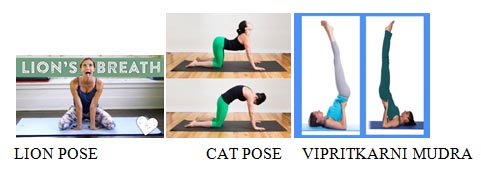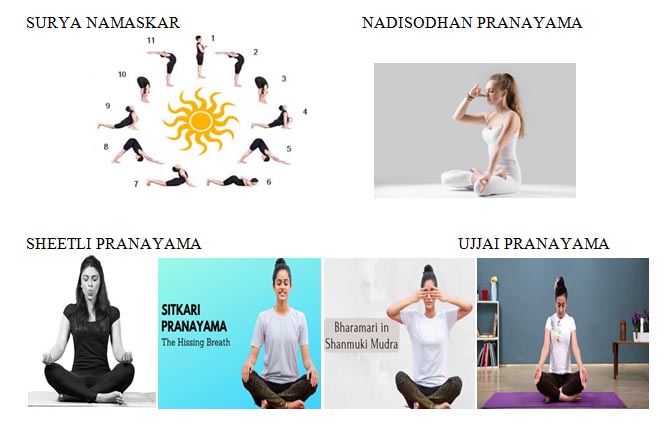Thyroid disorder has indeed become a household name these days, close behind hypertension and diabetes. According to a projection from various studies on thyroid disease, it has been estimated that about 42 million people in India suffer from thyroid diseases Also, the prevalence of the condition is believed to be higher in women than men. One of the leading causes of thyroid disorders is believed to be the stressful lifestyle we are leading.
Even though there is increasing prevalence of thyroid disorders today, there are numerous treatment options available to patients. Of course, every treatment would take time to show results, but in the meantime, you have something to cheer about. Yoga and meditation can help treat thyroid naturally. A few minutes of yoga practice daily helps reduce stress and also make your life smoother and happier.
Now, thyroid disorders can be of many types, but the two most prevalent ones are:
- Hypothyroidism (underactive thyroid)
- Hyperthyroidism (overactive thyroid)
It’s essential for you to check with your doctor which type of thyroid disorder you may be affected with. Specific symptoms may point towards either type of thyroid, but confirm with your doctor before starting any treatment.
You may have hypothyroidism if:-
- You are feeling disinterested in everyday affairs, getting lethargic and developing a laid-back attitude towards everything.
- You are doing just routine work as always but have started feeling more fatigued than usual.
- You just don’t seem to understand why you remain constipated of late.
- Your friends have started noticing a sudden weight gain, and you can’t seem to explain why as you wonder that you are not even overeating.
- You look at yourself in the mirror these days and notice your face getting puffy.
- You are feeling upset seeing your long, thick hair begin to thin suddenly and there are bunches of hair lying scattered all over the house.
- Your menstrual cycles are irregular (there could be other reasons for this too; better to check with your doctor).
- You are noticing excessive hair growth on the face which is becoming embarrassing.
- You can see your throat swell up. Surely, it’s time to see the doc.
Alleviate thyroid disorder with Yoga :-
Before you start practicing yoga for thyroid disorders, make sure to consult your physician. Also, these yoga techniques work on coping with the symptoms better and are not a substitute to medication (though in some cases the need for medicines may reduce with consistent yoga practice over a period of time).
Yoga asanas for hypothyroidism treatment :-
- Shoulder Stand (Sarvangasana)
- Inverted Pose (Viparita Karani)
- One-Legged Forward Bend (Janu Shirasasana)
- Fish Pose (Matsyasana)
- Plow Pose (Halasana)
- Cat Stretch (Marjariasana)
- Lion Pose (Simhasana)
- Fast-paced Sun Salutation (Surya Namaskar)
Slow-paced Surya Namaskars practiced with mantra chanting will have a calm and soothing effect.


Besides these yoga postures, the practice of pranayamas (breathing techniques) such as
- Kapal Bhati pranayama (Skull Shining Breathing technique),
- Nadi Shodhan pranayama (Alternate Nostril Breathing technique),
- Bhastrika
- Ujjayi pranayama also work well in reducing hypothyroidism symptoms.
You may have hyperthyroidism if:
- you are either gorging on food or eating less than usual. There may be a sudden change in appetite. But no matter how much you eat, you still remain lean (if you are desperately trying to put on weight, that is).
- you are finding it difficult to sleep at night.
- if you are sweating too much and unusually.
- small things are making you easily irritable.
- you usually remain anxious, nervous and quiet hurried about things
Yoga asanas & Pranayama recommended for hyperthyroidism treatment
- Bridge Pose (Setu Bandhasana)
- Lion Pose (Simhasana)
- Cat Stretch (Marjariasana)
- Child Pose (Shishuasana)
- Corpse Pose (Shavasana)

- Surya namaskar
- Ujjayi Pranayama
- Bhramari Pranayama
- Nadi sodhan Pranayama
- Sheetali & Sheetkari Pranayama

Slow-paced Surya Namaskars practiced with mantra chanting will have a calm and soothing effect.
Ujjayi, Bhramari pranayama (Bee Breath), Nadi Shodhan pranayama, and cooling pranayamas such as Sheetali and Sheetkari pranayamas are considered to be very effective in dealing with hyperthyroidism symptoms.
Also, it’s good to practice a few minutes of meditation every day in both, hypo and hyperthyroidism. Hypothyroidism patients who become laid-back due to the condition will need to make a conscious effort to stay physically active. And here is when meditation can really help strengthen your willpower to do so.
Since stress is believed to be one of the major factors of thyroid disorders, meditation keeps the mind calm, relaxed and alleviates everyday stress. Chanting ‘Om’ every day for a few minutes also helps. After chanting, put your hand on the thyroid gland and feel that it is getting healed. Let the positive vibrations of chanting have a stimulating effect on the thyroid gland.
Yoga Nidra also works well in both, hypo and hyperthyroidism, in reducing stress and calming you down. It also works like a power nap for hyperthyroidism patients who find it difficult to sleep at night.Practicing Yoga helps develop the body and mind, It is essential to learn and practice yoga under the supervision of a trained Yoga teacher.

Dr. Sujata Panda
PhD in Yoga, DNYS, N.D.,
Gold medallist,
Founder of Su-Ham Foundation
Owner of Viroga Virtual Clinic


Very good work over thyroid dr.sujata ?